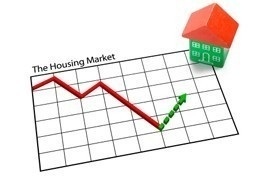Sales of previously owned homes rose in December for the third straight month, bringing the supply of homes listed for sale to the lowest level since 2006 and offering a glimmer of hope that the housing market could be starting to climb out of a profound downturn.
Existing-home sales increased 5% in December from a month earlier, to a seasonally adjusted annual rate of 4.61 million units, the National Association of Realtors said Friday. Lawrence Yun, the Realtors' chief economist, called the December gain "a good finish to a very tough year."
Many economists had predicted that 2011 would be the worst year on record for existing home sales, but the year ended with 4.26 million sales, about 1.6% higher than the 4.19 million existing homes sold in 2010. Market-watchers attributed this to a minor surge in sales at year-end, driven by historically low mortgage rates, falling prices, active investor-buyers and increasing consumer confidence.
Still, economists cautioned that it's too early to assume that the market is recovering. "These were positive numbers, but that doesn't mean the market is getting better. Lenders have been trying to get rid of distressed homes, and investors been snapping them up," said Patrick Newport, chief economist at IHS Global Insight. According to the Realtors report, investors purchased 21% of all homes in December, up from 19% in November.
Related Video
WSJ's Jon Hilsenrath has details of 2006 Federal Reserve transcripts that reveal the Fed did not forsee the coming housing bust and resulting economic downturn. Photo: REUTERS/Jason Reed
Brendan Conway has the morning's economic news that will impact markets on Tuesday, including Germany's confidence report, Jeffries and General Mills earnings reports, and new housing data. AP Photo/Gene J. Puskar
The inventory of homes for sale declined in December to 2.38 million, the equivalent of a 6.2-month supply, assuming the pace of sales remain at December's level. A six-month supply of homes typically is considered healthy, although NAR's numbers don't take into account the "shadow inventory" of homes that are either in foreclosure or on bank balance sheets and not yet listed for sale.
Prices, meanwhile, continue to fall. The median price in December was $164,500, down 2.5% from a year earlier. Prices were down in all regions except the West, where prices rose slightly, compared with a year ago. For all of 2011, the median was $166,100, the lowest since 2002.
"What you really want to see is sales going up, inventories going down, and prices going up, not down," said David Semmens, an economist with Standard Chartered. "People still feel they can hold off buying a house because the recovery won't be that aggressive. It's still very much a buyer's market."
That buyer's market allowed Andrew Gonzales, a 24-year-old police officer in Santa Fe, N.M., to be picky about price when looking for a home for himself and his three-year-old daughter. He closed last month on a $132,000, three-bedroom home in Rio Rancho, a suburb of Albuquerque, after the price was cut twice. Just before closing, the home was appraised for $18,000 higher than the sales price, at $150,000, by a private appraiser.
"I got tired of paying rent, and I'm a single father, so I wanted a home for my daughter," he said. "I was just waiting for the price to come down."
Vision Equity, a company that buys foreclosed homes at auctions in Indianapolis, stepped up the volume of its purchases this winter, buying about 45 homes a month in October, November and December, compared with about 30 homes a month last summer.
"There's a lot of cash investor activity right now," said Steve Olson, a spokesman for Vision Equity. "The chatter at the courthouse was, there's going to be a lot more product coming on the market, and the pricing is going to be good for investors. And we prepared our own investors for that."
 [1]National Association of REALTORS® President Moe Veissi made the following statement, regarding President Obama’s State of the Union address this week.
[1]National Association of REALTORS® President Moe Veissi made the following statement, regarding President Obama’s State of the Union address this week.






